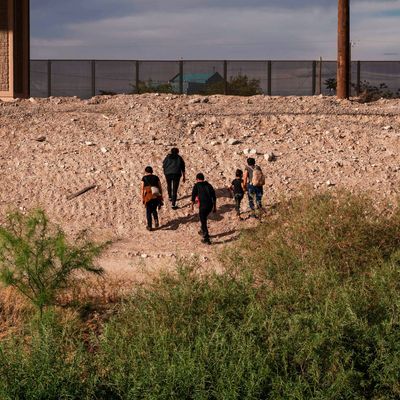
On the issue of migrants arriving at the U.S.–Mexico border, it’s easy for Democrats to deride Donald Trump’s fear-mongering lies, incoherent “solutions,” inhumane treatment of families, and sheer managerial chaos. It’s also true that immigration policy generally is much more important to rank-and-file Republican voters than to their Democratic counterparts. So the Donkey Party has been able to get by without their own clear set of alternative policies.
But as the situation on the border grows more unmistakably serious, even in the opinion of those rank-and-file Democrats, policy-making by sound bite is becoming increasingly less adequate, especially for the 22 Democrats running to displace Trump next year. So far the candidate with the closest thing to a comprehensive approach is Julián Castro, who is not exactly setting the political world on fire. But as the Washington Post’s Greg Sargent reports, there is a Democratic alternative consensus on migrant policy emerging in the U.S. Senate, with Minority Leader Chuck Schumer taking the lead:
Senate Democrats — including all the Senators running to unseat Trump — are set to roll out a new, multi-faceted plan to tackle the crush of asylum-seeking families at the border.
The hope is that the plan will give Democrats the foundations of a substantive blueprint in response to the asylum-seeking crisis — and, more broadly, for an answer of their own to Trump’s xenophobic and nativist nationalism, a vision to contrast with his.
The basic approach has already been expressed in legislation, but a rebranded version will be unveiled in response to the uptick in migrants (109,000 detained in April) and to Trump’s belief that a brutal “show of force” can deter migrants from setting out for the U.S. in the first place. As Sargent notes, it’s becoming apparent that the recent “purge” at DHS was motivated in part by internal resistance to a White House plan for mass arrests of thousands of migrant parents and children in ten U.S. cities. That the administration thinks inhumane treatment of children is a feature rather than a bug in U.S. immigration policy is all the opening Democrats need.
The Senate Democratic bill has four main features: (1) stepped-up financial assistance to El Salvador, Guatemala, and Honduras to mitigate the violence and extreme poverty feeding the migrant upsurge; (2) enhanced opportunities to apply for U.S. asylum while in Central America or Mexico, making the border trip unnecessary; (3) increased resources, including a lot more immigration judges, for adjudicating asylum petitions; and (4) more protections for children, including increased penalties for trafficking them, and adult sponsors for those who are unaccompanied.
As Sargent observes, the details are less important than the bright line the Senate bill draws between Democrats and Trump:
The Democratic vision is that retreating on our international humanitarian commitments to asylum seekers is unacceptable, and that the problem can be managed better, through a combination of addressing home conditions, providing other avenues to apply, and rationalizing the process for arrivals. Providing counsel and better information, increasing their chances of success, would incentivize showing up for hearings.
Trump, by contrast, refuses to entertain the very idea of managing the problem without dramatically scaling back our humanitarian commitments. That’s a goal in itself. He and immigration adviser Stephen Miller just want far fewer immigrants here, and are deeply devoted to that end.
At this point, all seven Democratic senators who are running for president are onboard with Schumer’s bill. That should clearly make it the starting point for the rest of the field, and a strong start toward a 2020 debate that isn’t just an endless cycle of Trump demagoguing on immigration and Democrats changing the subject.






























